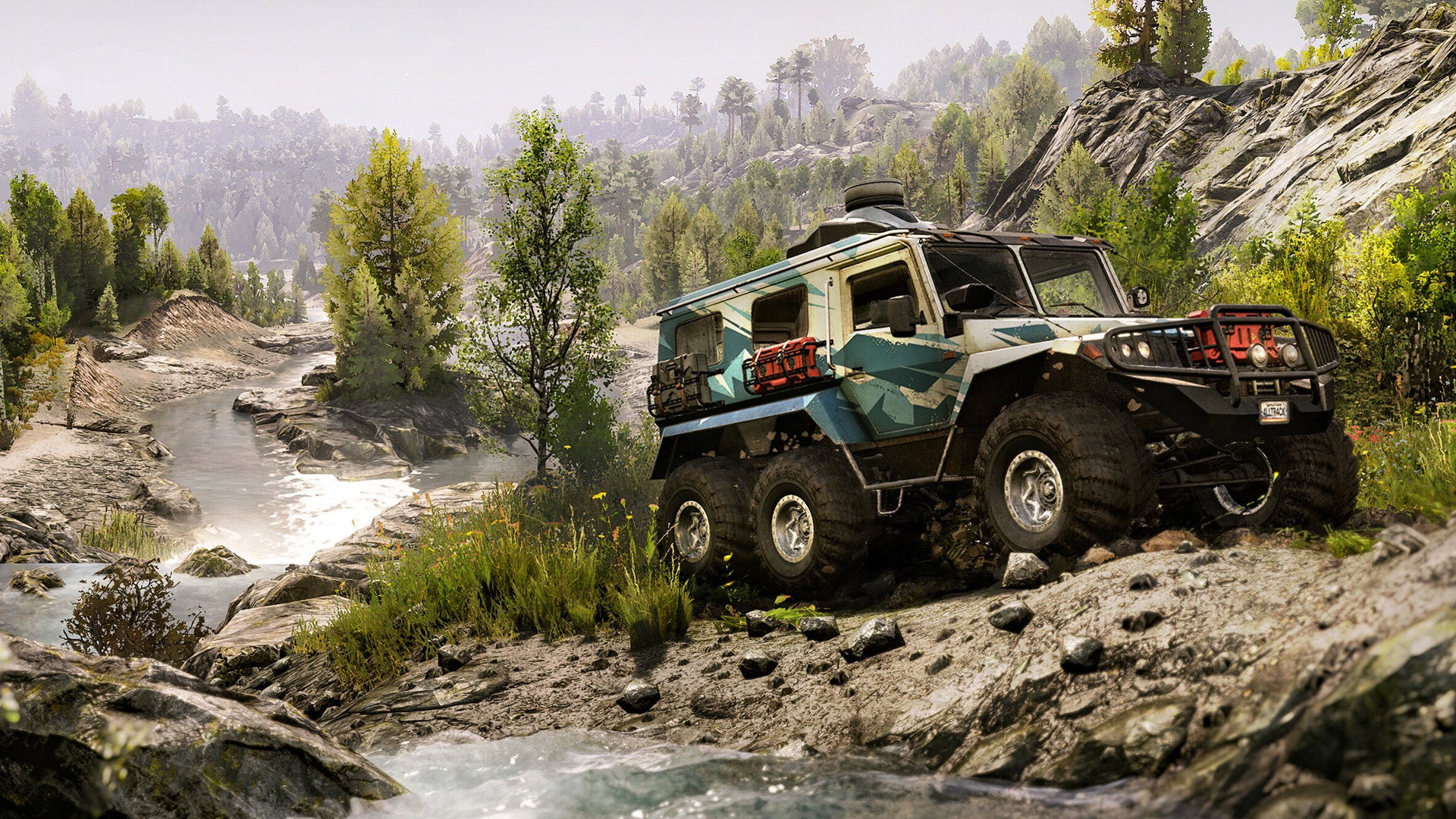MudRunner and SnowRunner may share the word we apply to humans and animals moving as quickly as they physically can but, rest assured, nothing about this series is rapid. That is, if you do find yourself moving particularly fast in these excellent, deliberately slow-paced, sandbox-style off-road driving simulators, there’s a strong chance it’s only because you’re tumbling down a mountainside.
Expeditions: A MudRunner Game is no different in this regard; it’s all about trundling over the terrain at turtle speeds. Victory is earned by staying upright and clawing your way through punishing environments that want nothing more than to tug your trucks deep into the ground – or topple them over. Where Expeditions is different is in the more untamed maps, and its mission design – which is now less about hauling goods and more about exploring the woods, so to speak. The good news is that Expeditions is a satisfying and worthwhile twist on the MudRunner/SnowRunner experience, even if mission objectives can get a little formulaic and frustratingly gated at times.
Again, while the core of both MudRunner and SnowRunner is really the challenge of moving bulky cargo and building materials down the sorts of muddy roads that would give a hippopotamus a hernia, Expeditions is a bit of a sidestep. For one, in terms of roads, there really aren’t any. Expeditions’ great looking environments – Colorado, Arizona, and Central Europe’s Carpathian Mountains – are basically just slabs of total wilderness. Rocky deserts, soggy gulches, dense forest, muddy rivers; it’s a nice spectrum. There are occasional signs of civilisation – say, perhaps some camping equipment, or a ferry, or a dilapidated bridge there to remind us that we haven’t been hurled back in time – but essentially Expeditions simply plonks us in the middle of nowhere.
That, in turn, informs the mission design. Sure, the vehicles feel the same as they have in the series to date as they wallow and churn through the physics-based, delightfully deformable muck, but instead of lugging lorries full of concrete slabs or lumber from point A to point B, Expeditions’ objectives are rooted in research and exploration. That may be trucking some seismic or meteorological equipment to an isolated spot, or it may be sniffing out an old aircraft wreck, or hunting down a dinosaur fossil. The simple inspection and scanning quick-time events that accompany reaching a destination feel mostly pointless, but I guess they’re slightly better than some kind of passive or non-interactive notification. That said, I will admit to being confused by their instructions occasionally, and only stumbling on the solution by looking around until I accidentally discover it. For instance, a prompt to “take a picture of the island" seems a bit vague and ill-considered when none of the things that look like islands in the vicinity are what it’s referring to (and completing the task requires us to zoom in on a large... mountain).
Truckin’ Problems
More annoying, however, is the way that some of the objectives are gated. For instance, sometimes mission goals are masked behind an “explore the area” requirement, which places a circle on the map screen and asks us to unshroud the area by exploring it. Hitting 100% will then trigger the next step in the mission. It’s a little arbitrary and repetitive, but I have found it’s been generally straightforward to 100% a zone by using Expeditions’ new drone feature (as flying the drone around uncovers the area just the same as driving around it does).
That is, until it wasn’t, and I was stuck inching my way back and forward across a marked area – at 97%, then 98%, and then an agonising 99% discovered – trying to find the sliver I’d missed. It took forever. Missed sections really need to be more evident on the map screen in this instance. It was simply not clear at all what part of this zone I hadn’t seen. Perhaps a different colour? Anything at all?
It was a particular problem in this mission because I wasted so much fuel schlepping around trying to find the last three percent that I ran out just 40 metres from the final objective and needed to replay the entire mission again. Well over an hour flushed down the drain. It is a relief that, once uncovered, areas don’t need to be re-explored on follow-up mission attempts – but redoing all of that initial navigation to pick up where you left off is extremely time-consuming and it’s not similarly rewarding the second time around.
The map system probably just needs a little more finessing in general, to be honest – particularly for anybody new to the series, it’s a sore spot. It’s odd, for instance, that some objective locations are not marked with a simple icon and require us to scroll to the objective on the map screen and have the cursor automatically place itself over the mystery spot we need to go, just so we can manually place our own navigation point. It’s an unnecessary step, and my prediction is that some people will simply be confused by the lack of an initial marker.
That would be a shame, too, because Expeditions is broadly a more approachable game than the likes of MudRunner and SnowRunner. I do feel a little railroaded here in Expeditions, in contrast to SnowRunner’s less restrictive design, as missions are only unlocked in a very specific order. I don’t hate it, but I also don’t think it’s a better system. On the other hand, I wouldn’t be surprised if the way missions are trickled out gives new players a more overt sense of progression.
One of Expeditions’ better ideas is a new crew member system that functions as a range of perks to give us a boost in certain situations, like resistance to specific damage or increased range for tools. Hiring them cuts into your profits, but it’s a tradeoff I found well worthwhile. It felt inessential at first, but before long I’d come to appreciate the bonuses afforded when bringing along certain staff. Certainly being able to embed ground anchors twice as far away makes them far more useful. There’s some light base-building in here too, but it seems expensive and so far I’ve mostly ignored it in favour of heavily modifying my trucks instead.
Those ground anchors are just one of the new tools that make taking on the terrain of the maps slightly less intimidating. Ground anchors can be instantly drilled and sunk into the rock or dirt to provide winch points when there aren’t any trees within range, and a depth sounder can be pinged to indicate when water is too deep to ford. The jack screw, in particular, almost feels like a cheat; it’s a tool that will painlessly right an overturned vehicle. You’d better believe I wasn’t too proud to use it, though. It’s certainly a handy device to have in your back pocket when things go pear-shaped after 90+ minutes of hard slogging.
At its trickiest, Expeditions is still a very challenging game, though, with a ton of important decisions to make at every turn. Do you lock the diff? Do you drop some tyre pressure? Do you have enough fuel to burn up a barrel of it hauling yourself up a hill that would haunt a mountain goat? This is Expeditions’ constant dance, and this is where it succeeds best. Every creek bed conquered, or mountain mastered, or valley vanquished is its own small victory.
Too Sunk to Truck
If you’re under the impression that, as a spin-off, Expeditions is some kind of smaller, low-fat SnowRunner experience, it’s not. With dozens of missions that can take anywhere from 20-odd minutes to the “very hard” ones that will potentially take several hours, it’s a very long game with a tremendous amount to do. Based on my current rate of progress, at around 40 hours, the main thread of missions alone is going to take me well over 100 hours to fully check off. Adding the side missions and other discoveries dotted around the map, I’d struggle to even estimate it. New side missions can be triggered and tracked immediately upon finding them in the world, too, which is a nice fix from SnowRunner.
That said, some of that bulk is inflated by the trial-and-error nature of Expeditions. It’s inevitable that sometimes you’ll bring an imperfect vehicle out on a job; one that won’t be able to cope with the specific challenges of the best (or perhaps only) route. Sometimes giving up and returning to base to upgrade your truck with a higher snorkel to prevent water damage, or more spare parts to build bridges across treacherous parts of the maps, is the only way forward. More horsepower isn’t always the solution. That is, sometimes it really doesn’t matter how many horses you have if you’re still on the wrong side of the river.
It’s curious that Expeditions doesn’t support co-op out of the gate, particularly as MudRunner and SnowRunner do, and Expeditions is clearly built on the same base. Presumably there’s a reasonable explanation, but the good news is that the developers have confirmed that co-op is coming at an unspecified later date. Just be aware that it’s not here presently in case that’s crucial for you.




